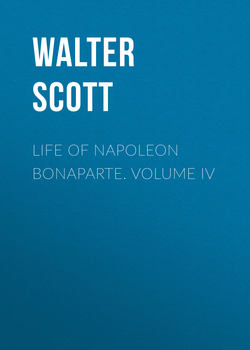Life of Napoleon Bonaparte. Volume IV

Реклама. ООО «ЛитРес», ИНН: 7719571260.
Оглавление
Вальтер Скотт. Life of Napoleon Bonaparte. Volume IV
CHAPTER XLIX
CHAPTER L
CHAPTER LI
CHAPTER LII
CHAPTER LIII
CHAPTER LIV
CHAPTER LV
CHAPTER LVI
CHAPTER LVII
CHAPTER LVIII
CHAPTER LIX
CHAPTER LX
CHAPTER LXI
CHAPTER LXII
CHAPTER LXIII
CHAPTER LXIV
CHAPTER LXV
CHAPTER LXVI
CHAPTER LXVII
CHAPTER LXVIII
CHAPTER LXIX
CHAPTER LXX
CHAPTER LXXI
CHAPTER LXXII
CHAPTER LXXIII
CHAPTER LXXIV
APPENDIX
Отрывок из книги
There is perhaps no part of the varied life of the wonderful person of whom we treat, more deeply interesting, than the change which took place in his domestic establishment, shortly after the peace of Vienna. The main causes of that change are strongly rooted in human nature, but there were others which arose out of Napoleon's peculiar situation. The desire of posterity – of being represented long after our own earthly career is over, by those who derive their life and condition in society from us, is deeply rooted in our species. In all ages and countries, children are accounted a blessing, barrenness a misfortune at least, if not a curse. This desire of maintaining a posthumous connexion with the world, through the medium of our descendants, is increased, when there is property or rank to be inherited; and, however vain the thought, there are few to which men cling with such sincere fondness, as the prospect of bequeathing to their children's children the fortunes they have inherited from their fathers, or acquired by their own industry. There is kindness as well as some vanity in the feeling; for the attachment which we bear to the children whom we see and love, naturally flows downward to their lineage, whom we may never see. The love of distant posterity is in some degree the metaphysics of natural affection.
It was impossible that the founder of so vast an empire as that of Napoleon, could be insensible to a feeling which is so deeply grafted in our nature, as to influence the most petty proprietor of a house and a few acres – it is of a character to be felt in proportion to the extent of the inheritance; and so viewed, there never existed in the world before, and, it is devoutly to be hoped, will never be again permitted by Providence to arise, a power so extensive, so formidable as Napoleon's. Immense as it was, it had been, moreover, the work of his own talents; and, therefore, he must have anticipated, with the greater pain, that the system, perfected by so much labour and blood, should fall to pieces on the death of him by whom it had been erected, or that the reins of empire should be grasped after that event "by some unlineal hand,"
.....
On the 15th December, just ten days after the official communication of her fate had been given to the Empress, Napoleon and Josephine appeared in presence of the Arch-Chancellor, the family of Napoleon, the principal officers of state – in a word, the full Imperial Council. In this assembly, Napoleon stated the deep national interest which required that he should have successors of his own body, the heirs of his love for his people, to occupy the throne on which Providence had placed him. He informed them, that he had for several years renounced the hope of having children by his well-beloved Empress Josephine; and that therefore he had resolved to subject the feelings of his heart to the good of the state, and desire the dissolution of their marriage. He was, he said, but forty years old, and might well hope to live to train up such children as Providence might send him, in his own sentiments and arts of government. Again he dwelt on the truth and tenderness of his beloved spouse, his partner during fifteen years of happy union. Crowned as she had been by his own hand, he desired she should retain the rank of Empress during her life.
Josephine arose, and with a faltering voice, and eyes suffused with tears, expressed in a few words30 sentiments similar to those of her husband. The Imperial pair then demanded from the Arch-Chancellor a written instrument in evidence of their mutual desire of separation; and it was granted accordingly, in all due form, with the authority of the Council.
.....